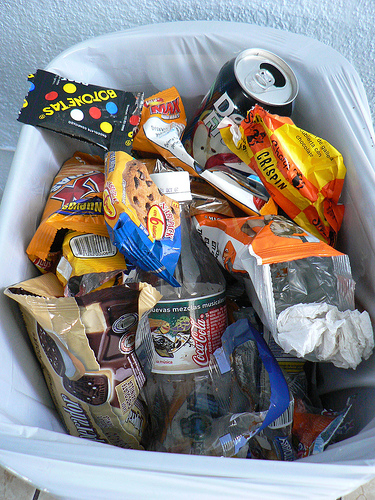Photo: Javier Aroche
I saw a poster recently that said:
Help me understand the logic of this:
Watching 2 hours of violence in a movie has no influence on our behavior.
But a 30 second Super Bowl ad is worth $3.8 million because it will make us run out and buy a product.
I’m pretty sure I’m about to step on some toes. But I’m not writing this to alienate all you Rambo fans or Vin Diesel devotees. And though some of those zillion dollar Super Bowl ads are funny, I’ve never leaped up off the couch to run out and buy something because of one.
That said, what are you putting in your brain on a daily basis?
We’ve all become pretty sensitive to what our children are ingesting brain-wise. We know the impact that the media has had on them in everything from self-esteem to eating habits. So we’re careful. We make sure that they don’t watch movies that give them nightmares or TV shows that glorify reckless behavior. We try to make sure their books don’t promote racial, sexual or ethnic stereotypes – or we sit our kids down and discuss those books that do.
Just as we are conscientious about the food we give our children to nourish their bodies, we work very hard to feed them mental input that will expand their brains and their horizons. We want what they watch, read and hear to empower them and support them.
But even though most of us adults are doing better when it comes to nutrition for ourselves and taking care of our bodies, I’d argue that most of us are still pretty sloppy when it comes to what we feed our brains.
We count calories and we’ve cut back on sugary sweets – but are we even aware of how much mental junk food (like celebrity gossip articles or goofy reality shows) we feed our brains every day? We avoid foods that give us stomach aches, but how many brain-aches do we give ourselves watching hours of sensationalized news shows and ranting talking heads?
“Wait a minute, Matt. Are you saying I’m not supposed to ever relax in front of the Golf Channel or read the latest Stephen King novel?”
No. Okay, well, maybe.
Think of it this way: If you’re on a diet to lose weight or improve your health, or if you’re training for something like a marathon, you’re probably pretty rigorous with what you eat, right? But if you’re at your ideal weight and health and are not training for anything special, maybe you can afford to snarf down a doughnut or two here and there.
And what if you’re facing some difficult challenges in your life or you’re working toward an important goal? The most powerful organ you have to overcome your challenges or achieve your goals is your brain. To get this powerful organ to work at its optimum, shouldn’t you be particularly careful about what you’re feeding it? Should you give it extra nourishment or feed it junk food?
Say you have the goal of getting out of debt and increasing your income by starting your own business. How helpful is it to listen to dire predictions about the economy, read articles on small businesses that have folded, and watch movies about brilliant artists who follow their dreams then die in poverty? Wouldn’t you be better off listening to inspirational CD’s? Reading articles with advice for small businesses? Watching movies based on success stories?
What if your goal is to get an advanced degree or another credential in your profession? Is Real Housewives of New Jersey going to help get you there? If you’re trying to recover emotionally from a tough divorce, how healing is it to devour articles about nasty celebrity divorces?
The point is not to cut out all lightweight entertainment or to hide your head in the sand when it comes to problems in our world. It’s about becoming conscious of what we’re feeding our brains and making conscious choices. What input will really support you in what you’re trying to become or overcome?
We used to believe that once we hit a certain age our brains were set. But now we know how plastic and malleable our brains really are. It’s not just our kids that are positively or negatively impacted by what they read, watch or hear. We are too.
So what have you packed in your brain’s lunch box today?
Mahalo,
Dr. Matt




